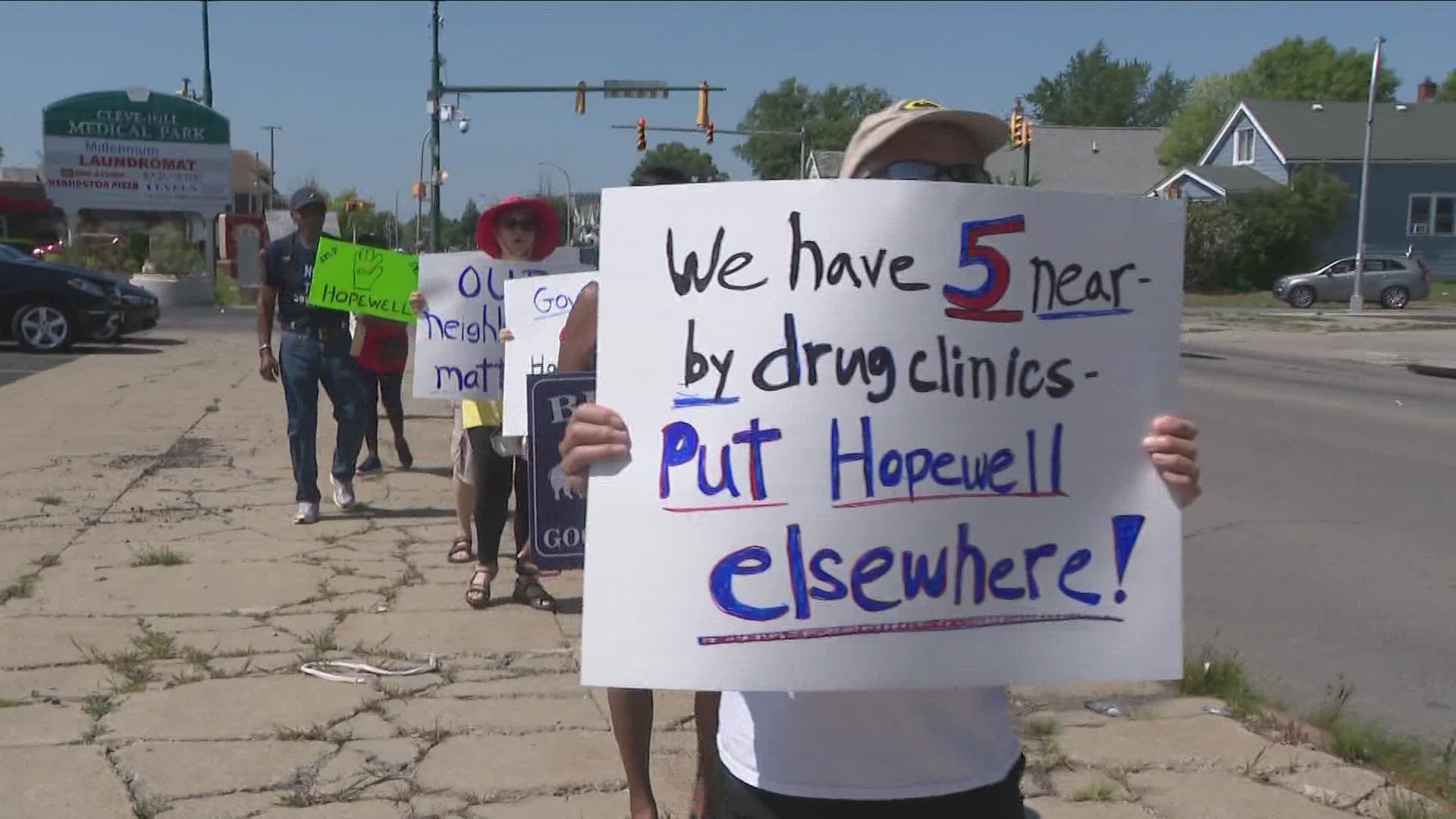BUFFALO, N.Y. — Neighbors who live in the University District of Buffalo are rallying against the Hopewell Center Substance Abuse Clinic, which is set to open at the Cleveland Hill plaza on Kensington Avenue next year.
It's not just because of the impact neighbors believe this addiction treatment center will have on their neighborhood.
They're also upset because they say they were only told about the clinic at two different public meetings, after it was approved federally and by the New York State Office of Addiction Services and Supports.
Neighbors are expressing concern over the location because they believe the facility will attract crime.
"(People will be) breaking into cars, loitering, people praying on other people's addictions," said Shekinah Powers, one of the protesters.
Added Diana Goodwin, who lives nearby: "We really feel unsafe here, and they need to take our opinions into consideration."
Buffalo Common Council Member Rasheed Wyatt oversees the University District. He supports neighbors, saying they have not been shown any data or been given an explanation as to why the site was chosen.
He's also written a letter to Assembly Majority Leader Crystal Peoples-Stokes and State Senator Tim Kennedy, asking them to facilitate a conversation between the Office of Addiction Services and Supports and the neighbors.
A week later, he's still waiting for a response.
"I can't recommend where it should go, but I know it shouldn't be done here because the residents have spoken loudly and clearly, that they don't want to see it here," Wyatt said. "We don't operate in a vacuum. This should have never been approved without the input of the residents. How do you do that?"
Added Powers: "All we ask is for a reversal. Go to another site. I don't think there's anything wrong with us asking for that, and to be told and be treated like it's not possible is just not acceptable. That's why we have to take a stand."
A Hopewell spokesperson says the company asked to meet with protesters on July 29, but they declined the meeting.
Wyatt told 2 On Your Side it's because residents don't want to negotiate with Hopewell, but instead with the Office of Addiction Services and Supports.
Hopewell officials provided some data to 2 On Your Side that was presented at the most recent Erie County Opiate Epidemic Task Force meeting:
- There have been 78 confirmed cases of Opioid Related Deaths in Erie County this year and another 123 pending through July 2022. That is nearly a life lost every day in Erie County, and on pace to break another record.
- While the opioid use disorder disease does not discriminate against race, gender, or age, the largest increases in lost lives is in the Black and Native American communities.
- In 2021, 156 lives were lost in the City of Buffalo alone, which represents over 50% of Opioid Related Deaths in 2021, with Buffalo only having 28% of the population in Erie County.
Despite the data, neighbors would like to see the facility elsewhere.
"Why not in the neighborhoods where a lot of people get addiction?" Herald Barnes said.
Barnes suggests the state put the facility by the Buffalo Niagara International Airport because it's more commercial than residential.
The site will serve residents in Erie County and bus those recovering in Cattaraugus County to and from the center.
It's also not the first addiction treatment facility to come to East Buffalo.
"There are already five located within two miles of the area," Powers said. "We don't need another one."
Hopewell's full statement:
“The Hopewell Center has conducted extensive planning and due diligence to develop a state-of-the-art opioid use disorder treatment facility in Buffalo. The goal of the Hopewell Center is to increase access to care for those suffering from opioid use disorder disease and provide a welcoming environment for our patients to receive treatment.
“The location search planning process involved balancing several factors, including convenient access to public and private transportation, the ability to attract top medical professionals and clinicians to staff the clinic, square footage to provide comprehensive programming, ample parking for patients and staff, and a location that allowed for medical use – all of which are criteria met at the Cleve-Hill Plaza.
“We realize that there are negative perceptions and stigmas associated with treatment facilities and the disease itself. For the past several months, the Hopewell Center has attempted to engage with local leadership and community stakeholders to accurately inform area residents about the clinic and its operations. We have also worked to correct misinformation that has spread in the community.
“Just as individuals have the right to protest, so do individuals have the right to receive professional medical treatment for opioid use disorder disease in a safe and private environment. We are confident that the Hopewell Center will be an asset to the Cleve-Hill Plaza, the surrounding neighborhood, and most importantly will save lives.
“The opioid epidemic continues to have a devastating impact on all communities and all walks of life with record breaking overdoses this past year. In 2021, there were 280 opioid related deaths in Erie County – 156 of those lives lost came from the City of Buffalo, with the largest increase in deaths among African Americans and Native Americans over the last four years.
“The Hopewell Center will be open to ALL seeking treatment for opioid use disorder disease throughout the city of Buffalo and beyond. We look forward to continuing our efforts to work in collaboration with community leaders and area residents to help improve the
Cleve-Hill Plaza, support the neighborhood, and provide much needed access to treatment as our broader community continues to struggle with the increasing opioid epidemic.”

